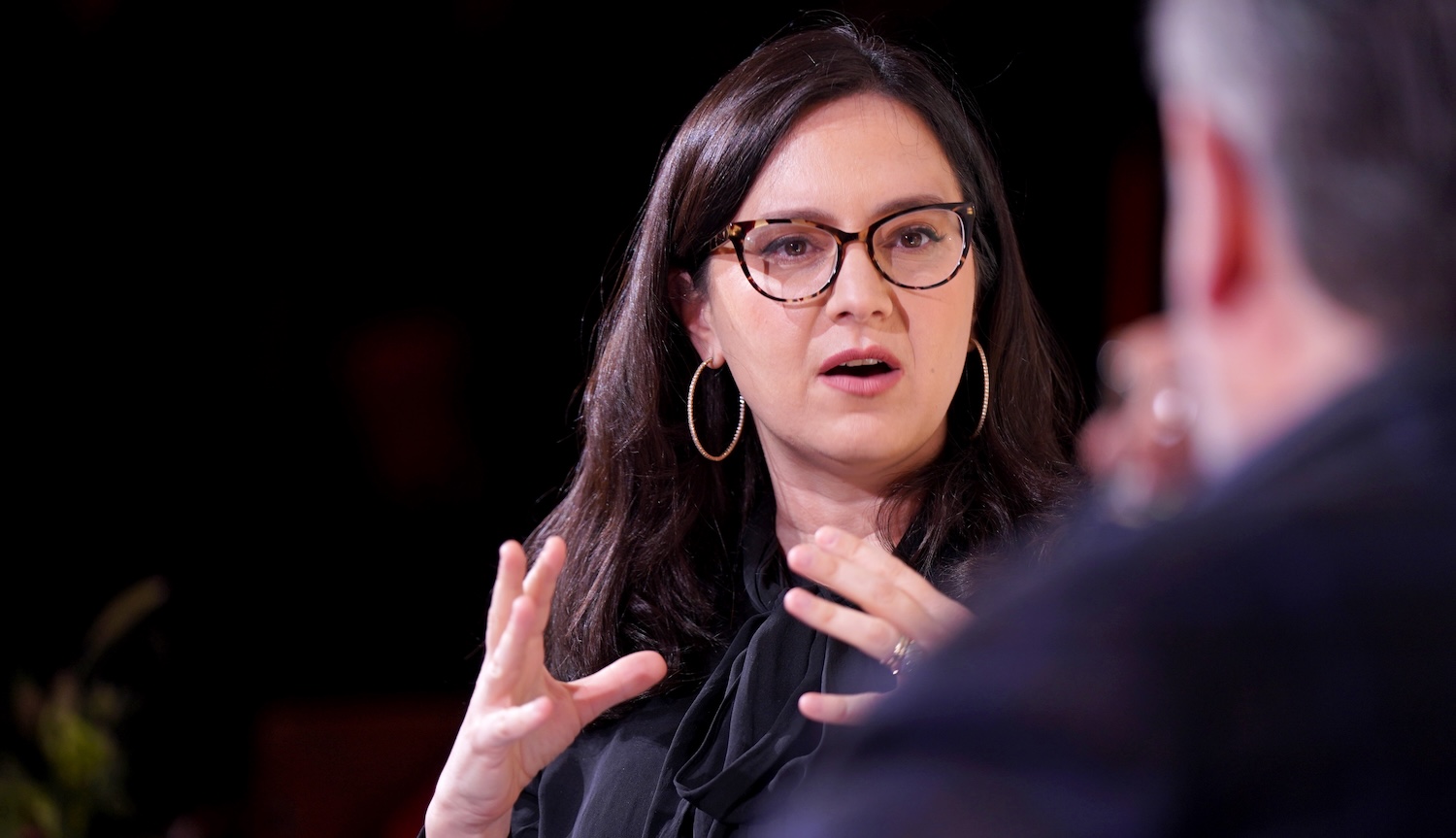On Monday, newly appointed Paramount CEO David Ellison announced that his company had acquired the Free Press, the smirking blood-and-soil blog founded and run by former New York Times hall monitor Bari Weiss. As part of the deal, Weiss will ascend to the role of editor-in-chief of CBS News, a Paramount property and one of the biggest news organizations in the country.
How could the Free Press—the total editorial output of which on a given day amounts to one or two reheated versions of "The Kids These Days Are Crazy," something like "Liberal Mayors Keep Lying About The 'Black Issue,'" and "How This IDF Wife Is Balancing Motherhood And Killing Child Terrorists"—be worth a reported $150 million, and why is its oafish founder about to oversee a huge press operation? Respectively: It isn't, and she shouldn't. The acquisition only makes sense in the context of both a significantly larger deal and its broader project of media reorientation. Now that the Free Press deal has gone through and Weiss has taken one of the most powerful positions in American news, the richest people in the world will have taken big steps toward ushering in the toothless, acquiescent future of mainstream media they have always wanted.
Before getting to Weiss, we have to establish the context for what's happening at CBS News, and why its owners would be looking for new leadership. That story starts with David Ellison, the firstborn son of the third marriage of Larry Ellison—Oracle founder, recently and fleetingly the wealthiest person in the world, and Israel Defense Forces mega-donor. The younger Ellison founded the production company Skydance Media in 2006, and three years later signed a four-year, $350 million deal with Paramount to co-finance four to six movies per year. David says he's always envisioned Skydance as a technology concern and "media company 2.0" instead of a hidebound movie production company, a vision he credits to some advice he got from his father's friend Steve Jobs, who years ago told him, more or less, to try to make something good instead of something that sucks. Insightful.
Over the decade following the initial Paramount partnership, Skydance re-upped its deal with Paramount twice, spun out sports and animation divisions, and in 2018 sold a minority stake to the Chinese multinational holding company Tencent, at a valuation beyond $1 billion. Four years later, Skydance reached a huge deal with the NFL and raised yet more money at a valuation four times greater.
Meanwhile, Paramount was bleeding out. The smallest member of the so-called Big Five movie studios was one of many assets controlled by the Redstone family via its umbrella company National Amusements, which also included the entire agglomerated mass of CBS and Viacom. In 2022, after several internal reorganizations, power struggles, and seemingly contradictory consolidations and disaggregations, the wheezing media company rebranded itself as Paramount Global. All the news, movie production, and 871 seasons of Survivor would finally be siloed in one place, deftly leveraging the "iconic global name" to create one of the most widely reviled streaming services, Paramount Plus.
Better late than never, though the beaming omnipresence of Jeff Probst could only make up for so much. National Amusements controlled 77 percent of voting shares at Paramount, but only 10 percent of total shares; a declining Paramount stock dividend would leave the Redstones cash poor but in possession of a trove of significant media rights. By mid-2024, Paramount Global had over $14 billion in long-term debt.
So Paramount's board began exploring a sale. Amid bids from a host of familiar names, Skydance quickly emerged as the likeliest winner. After agreeing to terms, then not agreeing to terms, and finally agreeing to terms again, all within a month in the summer of 2024, the two companies announced on July 2 of that year that they would merge and become Paramount Skydance Corporation.
Consummating a deal of that size and import is not as simple as one party making out a check for $8 billion and shaking hands with the other party. Because the proposed merger involved the transfer of dozens of CBS broadcast licenses, it required the approval of the Federal Communications Commission. That is a much thornier proposition under a Donald Trump FCC, as the Paramount-Skydance merger amply illustrated.
The current FCC chairman is Brendan Carr, who wrote the FCC section of Project 2025, then spent the election run-up openly campaigning for the agency's top spot by going on Fox News often and repeatedly pitching the idea of stripping licenses from non-conservative broadcasters. Rather than pursue an agenda of simple deregulation, the FCC under Carr—like basically every other organ of federal power left intact after the exsanguination overseen by Trump and Elon Musk—has turned its regulatory authority outward and assumed an offensive bearing. What that means in practice is that any deal passing through FCC halls will be subject to a wide array of Trumpish debasements.
For evidence of the effectiveness of Carr's gangster-state posturing, consider the speed with which the ABC network yanked Jimmy Kimmel Live! off the air—less than two days into a bad-faith right-wing freakout over Kimmel's manifestly correct observation that the right would use Charlie Kirk's death to advance its agenda—after Carr's threatening remarks about "[doing] this the easy way or the hard way" on the podcast of plagiarist Benny Johnson. ABC folded in such haste in part because the media company Nexstar, the largest television-station owner in the U.S. and operator of many local ABC affiliates, was seeking approval on a $6.2 billion deal to buy the Tegna broadcasting company, a deal that would give Nexstar reach into 80 percent of U.S. homes. Not only does Nexstar need FCC approval for that deal, it needs Carr to change FCC bylaws for the deal to even be legal in the first place. Both parties thus identified common ground: Nexstar gets its merger, and Carr gets to discipline big-time liberal media.
CBS News, the FCC's greatest source of leverage over the Paramount-Skydance deal, has been a Trump target for years. He notably filed a frivolous lawsuit against the company just before the 2024 election, over obviously fake allegations that the news program 60 Minutes had selectively edited an interview with Kamala Harris. As president, Trump wields both the power and clear willingness to scuttle any merger unless its parties dance for him, both of which he successfully leveraged in both securing a bribe and changing the shape of an enemy.
Longtime 60 Minutes executive producer Bill Owens resigned in April, after persistent editorial meddling from Paramount higher-ups clearly angled toward mollifying the president and securing the merger. "Once Paramount and Skydance agreed to merge," host Scott Pelley said on-air shortly afterward, "Paramount began to supervise our content in new ways. Bill felt he'd lost the independence that honest journalism requires."
Shari Redstone, the head of the Redstone family's National Amusements company and reportedly a driver of the Paramount-Skydance merger effort, could not have been more willing to roll over for Trump. She told the Times she came around on appeasing the president because she saw it as a way to discipline her organization's newsroom for its insufficiently bloodthirsty coverage of the Israeli genocide in Gaza. "We needed more balance," Redstone said. "Part of me thought, maybe Trump could accomplish what I never got done." Paramount announced a $16 million settlement of Trump's frivolous lawsuit on July 2—tidily, a year to the day after the announcement of the merger agreement—and Ellison agreed to run between $15 million and $20 million worth of "public service ads to promote causes supported by the president."
On July 15, Carr and David Ellison met to discuss Skydance’s "commitment to unbiased journalism." Ellison got to work quickly. Two days later, CBS announced the cancellation of Stephen Colbert's late-night show—not a journalistic enterprise, but one regularly critical of Trump and his administration—confirming earlier reporting from Oliver Darcy that the network would disingenuously frame the move as a cost-cutting measure. Ellison said the post-merger Paramount would focus on "American storytelling," and also that he would eliminate Paramount's diversity, equity, and inclusion (DEI) program and install an ombudsman to "crack down on perceived bias."
With Ellison dismantling CBS institutions, he will have to build new ones. The departure of Owens, a widely revered journalism lifer, potentially clears space for Weiss, a talentless operator who had to quit her New York Times opinion-writer job after she failed at getting the paper to fire her (they did briefly exile her to Australia). Weiss recovered from the embarrassment of never having been martyred for heterodoxy, built the Free Press into Substack's highest-revenue news site, and oversaw an investment round last year that netted the FP $15 million at around a $100 million valuation, with buy-in from right-wing billionaires like Marc Andreessen—a Peter Thiel acolyte whose venture firm also invests in Substack itself—and Trump's diminutive crypto czar David Sacks. Per the Financial Times, Ellison approached Weiss this past summer about acquiring the Free Press due to her staunch support for Israel and her "ability to build a younger, digitally savvy audience."
In light of Weiss's pending ascent, consider the state of mainstream media over the past decade. Since 2015, Trump has waged war on the media at an institutional level. He's been extremely successful, and one of the particularly disturbing characteristics of the second Trump administration is how far and how quickly the media, both structurally and tonally, has moved to the right. After the New York Times and Washington Post positioned themselves as the backstop of democratic freedom in the wake of the 2016 election, the two newspapers have shrunk from the challenge. Under Jeff Bezos, the Post has been defanged, all but explicitly telling its readers that it's no longer in the business of telling truth to power. The Times has repositioned itself as a games and recipe company that happens to sell papers, obviating its own argument that it represents a critical fount of liberal morals with its support for Israel's campaign of genocide in Gaza.
TV news is declining as a relevant medium, though tons of old people still watch it. The non-Fox programming is as feckless as the national Democratic party, which has itself steadily leaned rightward for the past few years. MSNBC, soon to be rebranded to MSNOW, recently fired Matthew Dowd for accurately characterizing Charlie Kirk's beliefs, which I would argue reflects the tensions inherent within corporate, nominally liberal media. Pleasing the upper class, who owns and funds media organizations, while also taking the right-wing president to task represents a contradiction, one that doesn't need resolution only so long as nobody's class position is threatened. But when the profit margins are endangered, as MSNBC bosses clearly feared it would be if they were to stand behind Dowd, the journalism will always be sacrificed.
Consider the mass rightward shift within the tech world, a once reliably Democratic-leaning bloc whose thought leaders are all basically either pro-Trump or committed to an esoteric network-state politics that accommodates Trump as a means to a common end. (Also, remember that the most powerful people in tech fund the Free Press.) The tech world's operative allegiance is to capital, accumulation of which relies on either indifference or acquiescence from the state. It makes obvious business sense to cozy up to power, especially if you are in the business of regulatory arbitrage. The tech story is also necessarily a media story: Both sectors are in the business of reality creation, and have evolved in parallel where they haven't out-and-out partnered.
Bezos's ownership of the Post is the cleanest example of such a partnership. The Amazon mega-billionaire was happy to be seen as the exemplar of media patronage, singlehandedly keeping Democracy from Dying in Darkness, until the winds changed. In this case, it wasn't so much that his margins were threatened as that he saw a chance to increase them by capitalizing on a rightward shift. There's more of a percentage in positioning your paper as a semi-official mouthpiece of an American dictatorship than holding up a flashlight for Democracy.
As with every other major shift in American life this decade, 2020 marked a major turning point here. The supposed excesses of brief calls for racial justice were deemed so intolerable—due largely, I would argue, to the political and media classes spending three years shrieking about crime and explicitly tying it to said calls for racial justice—that they boomeranged into people essentially apologizing for saying George Floyd's murder was bad, and promising a newfound commitment to being more racist.
While the mainstream started shifting right, a new wave of partisans moved in from the fringes to the core, with race-science podcasters assuming the same level of import under Trump that Times journalists had under Barack Obama. Those people are mostly unconcerned with persuasion, merely dominance and propaganda, conjoined neatly in the project of retconning Kirk from a racist organizer into the white Martin Luther King Jr. While the ascendance of those people is one blow to mainstream media as it used to be, the larger-order remaking of the fourth estate under Trump involves not just the attempted destruction of the media, but its replacement. This is where Weiss re-enters the story.
Dylan Byers notes in his recent writing that Weiss's news outlet is willing to occasionally criticize Trump, which in his reading means she should not be thought of as regime media, but instead as something like a reasonable and courageous centrist. This says more about Byers's hack nature, and the Shamsical ways he cultivates sources, than Weiss's actual editorial sensibilities, though he accidentally backs into a correct framing of Weiss's position. Weiss is not in the same orbit as rabidly partisan Newsmax operators or extremists like Nick Fuentes, which is precisely what defines her utility. Unlike those hooting idiots, Weiss speaks the language of elite liberal institutions, and her intended audience is people who know how to read. The project—hers and that of her backers—is to establish herself and her cohort not as new-right media, but as the new liberal media, staking out the leftmost acceptable position within the new right-wing paradigm.
That is extremely useful both as an onboarding mechanism for a certain class of disaffected liberals, and to her billionaire backers. Larry and David Ellison are in the process of securing control over a vast swath of the American media landscape. The Paramount deal and the subsequent $7.7 billion overpay for the UFC to longtime Trump ally Ari Emanuel (seen ringside with Ellison, Trump, and Musk in April) set the stage for Oracle to go after the gigantic Warner Bros. Discovery company and gain control of U.S. TikTok at a fire-sale price. (Again, as with the Weiss acquisition, the Ellisons' steadfast support for Israel is not incidental, but rather a motivating factor.) It's a play for monopoly control. Buying off the president is the important part, but they still need to sell it.
The Ellisons and the rest of the billionaire class don't need the aerodynamic drag of association with fringier right-wing stuff; they want the prestige and lubricity of affiliation with important, elite institutions. That's the value proposition of the Ivy-incubated, Wall Street Journal and New York Times veteran Weiss: obsequiousness to power and capital without any of the wacky stuff, the imprimatur of elite consensus unburdened by any inconvenient commitment to reporting on the business of powerful people. What does this look like in practical terms?
You can get a sense for why Weiss is a person for the moment by looking at how her editorial sensibilities and mission have evolved in the past few years. Initially she might seem like an odd fit at CBS, given that the Free Press doesn't really break news, and has narrowed its editorial scope over the past five years, sliding rightward from an exhausting and disingenuous Never Trump-ish faux–Classical Liberal attitude to the even more exhausting yet slightly more coherent role as an outer functionary of the Trump movement.
As David Klion detailed in an essential story for the Guardian, many of the real "scoops" that the Free Press has published—such as the one about the Trump administration cracking down on Columbia—have been fed to it by Trump apparatchiks. The rest conform to a dismal rubric: Some disgruntled reactionary party at an elite liberal institution—Columbia University, CBS itself, NPR—correctly deduces that the Free Press is the place to go if you want to excoriate the institution or punish your colleagues for their views, be they insufficiently obsequious to Trump, hostile to the project of genocide in Gaza, or intolerant of weird cranks among their ranks. The Free Press makes a natural repository for this trash, because the publication assumes the same posture as those sweaty self-cancelers, presenting itself as a version of the New York Times courageous enough to engage in race realism or (Ezra Klein-approved!) slobbering-wolf horniness for the robot virginity of an AI "actress."
In the process, Weiss gets to continue two of her lifelong passion projects: trying to get people fired, and mainstreaming previously verboten ideological strands, like how the Nazi salute means something else or how genocidal starvation is actually fine. Even in the most generous reading—where her entire career and indeed life might reflect anything more than the cold calculus of a pure cynic who wants the approval and patronage of the world's richest and vainest reactionaries—Weiss's entire worldview is in the negative. She positions herself as a freewheeling intellectual and iconoclast, taking on the stilted orthodoxies of liberal power, but the irony is that her effectiveness is totally circumscribed by the limits of that orthodoxy. She does not have an original thought in her head, merely a list of supposed excesses and hypocrisies riddling the elite liberal world.
Something like the Emmy Awards failing to pay insufficient tribute to the recently deceased Charlie Kirk is the perfect Weiss bugbear (the story she links in her Twitter post is written by her somehow even less talented sister), with nothing on offer other than a tsk-tsk of the media for a totally imagined failure. There is a mismatch between the grandiosity of Weiss's rhetoric and pettiness of her grievances; to the Free Press, the matter of elementary school teachers reading a certain book to their students signals a crisis in the West. A "Kindergarten Intifada" allows people to give their own small-mindedness a sheen of grand civilizational import.
What makes the Free Press an attractive prize for Ellison is its choice of enemies—or, to engage in a smidge of Weissian anti-writing, whom it never goes after. The Free Press only punches down and to the left, never at those who hold real power but lustily at their critics and adversaries. If you are a billionaire buying a media organization in order to consolidate your power, you could not find a more eager servant than Weiss, someone blissfully captured by the richest people alive, and invested in smashing the last vestiges of liberal power in this country: universities, civil servants, and the media. She has a cop's heart and a tadpole's brain, which makes her the ideal partner for someone like David Ellison.
Weiss's website has around 155,000 paying subscribers, which is not insignificant, but that's one for every 77 the Times has, despite heavy investment from some of the most powerful people in the country. The disproportionate influence of the Free Press, then, is entirely down to who reads it. There are plenty of iPad-wielding dads and disgruntled normal people who find its warmed-over dog food worth consuming, but its popularity alone doesn't make it worth the reported $150 million cash-and-stock acquisition price. If you have the billionaire class in thrall, though, the normal rules do not apply. You can court patrons from the richest segment of society, and all you have to do is flatter them and their sensibilities.
By now, noting the disjunction between Weiss's trumpeted commitment to free speech and her demonstrated commitment to smothering her critics is a bit hack. What I will say is that the hypocrisy on display there is not incidental to her appeal to a guy like Ellison, but very close to the heart of it. Weiss has an insatiable metabolism for other people's anger, as she capably digests it into further proof of her claims to courageous truth-telling. Her new billionaire backers get an agent expert at turning people's ire toward other, softer targets—someone who can process it into fuel.






